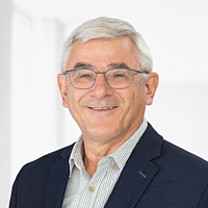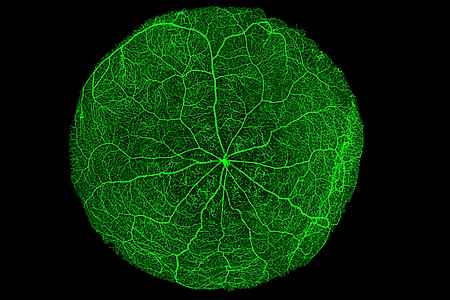You are here
Content
The field of angiogenesis research has been one of the most rapidly growing biomedical disciplines. As an outcome, anti-angiogenic therapies have received clinical approval in the field of oncology and ophthalmology. Anti-angiogenic tumor therapy marked an important change of paradigm as the first clinically effective anti-stroma tumor therapy. Today, anti-angiogenic drugs account for some of the heaviest selling anti-cancer drugs. Yet, their clinical efficacy is limited. As such, ongoing research is aimed at shedding further mechanistic insight into the complexity of the angiogenic cascade in order to improve established anti-angiogenic tumor therapies. Moreover, vascular-targeted strategies may in the future be exploited as stromal reprogramming therapies aimed at facilitating novel personalized combination therapies, including the combination with established and emerging immunotherapies.
The Department of Vascular Biology and Tumor Angiogenesis is towards this end
- studying the molecular mechanisms of angiogenesis, vessel maturation, maintenance and regression focusing on the Angiopoietin/Tie system
- unraveling the functional interplay of tumor cells with endothelial cells, pericytes, tumor-associated fibroblasts and immune cells during tumor progression and metastasis
- elucidating the mechanisms of ageing in the vascular system and the involvement of vascular ageing in disease
- developing preclinical models of tumor progression and metastasis better mimicking the pathogenesis and the course of human tumors as well as their response to therapy
- pursuing preclinical combination therapies and uncovering the MOA of such therapies for the mechanism-guided development of novel anti-tumor therapies.
Selection of project-related publications
- Preuss SF*, Grieshober D*, Augustin HG: Systemic reprogramming of endothelial cell signaling in metastasis and cachexia. Physiology. 38(4):189-202, 2023.
- Hübers C*, Abdul Pari AA*, Grieshober D*, Petkov M, Schmidt A, Messmer T, Heyer CM, Schölch S, Kapel SS, Gengenbacher N, Singhal M, Schieb B, Fricke C, Will R, Remans K, Utikal JS, Reissfelder C, Schlesner M, Hodivala-Dilke KM, Kersten S, Goerdt S, Augustin HG#, Felcht M#: Primary tumor-derived systemic nANGPTL4 inhibits metastasis. J Exp Med. 220:e20202595, 2023.
- Jakab M*, Rostalski T*, Lee KH, Mogler C, Augustin HG: Tie2 receptor in tumor-infiltrating macrophages is dispensable for tumor angiogenesis and tumor relapse after chemotherapy. Cancer Res. 82(7):1353-64, 2022.
- Augustin HG, Koh GY: Antiangiogenesis: Vessel regression, vessel normalization, or both? Cancer Res. 82(1):15-17, 2022.
- Singhal M, Gengenbacher N, Abdul Pari AA, Kamiyama M, Hai L, Kuhn BJ, Kallenberg DM, Kulkarni SR, Camilli C, Preuß SF, Leuchs B, Mogler C, Espinet E, Besemfelder E, Heide D, Heikenwalder M, Sprick MR, Trumpp A, Krijgsveld J, Schlesner M, Hu J, Moss SE, Greenwood J, Augustin HG: Temporal multi-omics identifies LRG1 as a vascular niche instructor of metastasis. Sci Transl Med. 13(609):eabe6805, 2021.
- Inverso D, Shi J, Lee KH, Jakab M, Ben-Moshe S, Kulkarni SR, Schneider M, Wang G, Komeili M, Vélez PA, Riedel M, Spegg C, Ruppert T, Schaeffer-Reiss C, Helm D, Singh I, Boutros M, Chintharlapalli S, Heikenwalder M, Itzkovitz S, Augustin HG: A spatial vascular transcriptomic, proteomic, and phosphoproteomic atlas unveils an angiocrine Tie-Wnt signaling axis in the liver. Dev Cell. 56(11):1677-1693.e10, 2021.
- Koch PS*, Lee KH*, Goerdt S, Augustin HG: Angiodiversity and organotypic functions of sinusoidal endothelial cells. Angiogenesis. 24(2):289-310, 2021.
- Abdul Pari AA*, Singhal M*, Augustin HG: Emerging paradigms in metastasis research. J Exp Med. 218(1):e20190218, 2021.
- Gengenbacher N*, Singhal M*, Mogler C, Hai L, Milde L, Pari AAA, Besemfelder E, Fricke C, Baumann D, Gehrs S, Utikal J, Felcht M, Hu J, Schlesner M, Offringa R, Chintharlapalli SR, Augustin HG: Timed Ang2-targeted therapy identifies the Angiopoietin-Tie pathway as key regulator of fatal lymphogenous metastasis. Cancer Discov. 11(2):424-45, 2021.
- Jakab M, Augustin HG: Understanding angiodiversity: insights from single cell biology. Development. 147(15):dev146621, 2020.
A complete list of Hellmut Augustin's publications can be found here.
Context Column
Contact

Hellmut Augustin, DVm, PhD
Professor and Chair
Department of Vascular Biology and Tumor Angiogenesis
Medical Faculty Mannheim, Heidelberg University
Ludolf-Krehl-Str. 13-17
68167 Mannheim
Phone +49 621 383-9960
augustin@angiogenese.de

